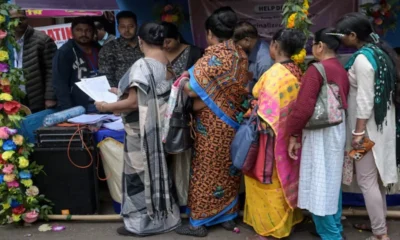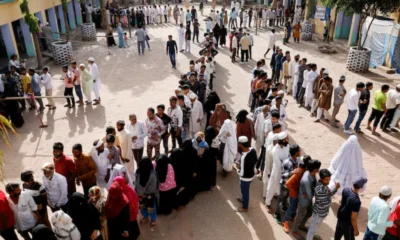India on Tuesday, April 3, welcomed US decision to designate Lashkar-e-Taiba’s (LeT) political front, the Milli Muslim League (MML), as well as another front organisation Tehreek-e-Azadi-e-Kashmir (TAJK) as foreign terrorist groups.
Seven members of the MML’s central leadership body were designated as foreign terrorists by Washington on Monday, said media reports.
Welcoming the decision, India said it reflects rejection of the attempts being made in Pakistan to mainstream terrorist individuals and entities. Reacting to the US move, the external affairs ministry said the designation of the MML also shows Pakistan’s failure to dismantle terror sanctuaries in that country and vindicated India’s position that Islamabad has not taken effective action against terrorist groups and individuals.
“India welcomes the action taken by the US for designating the Milli Muslim League as an alias of Lashkar-e-Taiba (LeT), a Pakistan based terrorist group and its functionaries who are acting on behalf of LeT,” the MEA said.
“It is also cognisance of the fact that terrorist individuals and entities are allowed to change names and continue to operate freely from territory under Pakistan’s control,” the ministry said in a statement.
The ministry said the designation of the MML is a rejection of the attempts being made in Pakistan to mainstream terrorist individuals and entities and highlights Pakistan’s failure to fulfil its international obligation to dismantle terrorist sanctuaries, and disrupt terror financing.
US State and the Treasury Departments announced that the MML, which openly campaigns with posters of LeT chief Hafiz Saeed, had been added under LeT’s designation as a “Foreign Terrorist Organization” (FTO) and as a “Specially Designated Global Terrorist” (SDGT) under two different laws.
Members who were designated as SDGTs included MML President Saifullah Khalid, Vice President Muzammil Iqbal Hashimi, General Secretary Fayyaz Ahmad, Joint Secretary Muhammad Harris Dar, Information Secretary Tabish Qayyuum, Finance Secretary Muhammad Ehsan as well as Broadcast and Publications Secretary Faisal Nadeem, specified the Treasury Department.
The Treasury Department said that “all property and interests in property of these persons subject to US jurisdiction are blocked” and US citizens were banned from having any transactions with them.
“LeT continues to operate freely within Pakistan, holding public rallies, raising funds and plotting and training for terrorist attacks,” the State Department said.
The State Department said the move was aimed at denying the LeT resources it needs to plan and carry out further terrorist attacks.
“Both MML and TAJK are LeT fronts created to circumvent the sanctions against it (LeT)…Today’s amendments take aim at LeT’s efforts to circumvent sanctions and deceive the public about its true character,” said Nathan A Sales, Coordinator for Counterterrorism at the Department of State, according to media reports.
The LeT was designated as a Foreign Terrorist Organization (FTO) and Specially Designated Global Terrorist (SDGT) group on December 26, 2001. Its leader, Saeed, is also designated as a SDGT.
To avoid sanctions, the LeT has repeatedly changed its name over the years, the State Department alleged.
“Make no mistake: whatever LeT chooses to call itself, it remains a violent terrorist group. The US supports all efforts to ensure that LeT does not have a political voice until it gives up violence as a tool of influence,” Sales said.
Treasury Under Secretary Sigal Mandelker warned that “those working with the Milli Muslim League, including providing financial donations, should think twice about doing so or risk exposure to US sanctions.
“Treasury is targeting the Milli Muslim League and a group of seven global terrorists who are complicit in LeT’s attempts to undermine Pakistan’s political process,” she added.
Saeed created the MML in August last year as the group’s political front. LeT members make up MML’s leadership and the “so-called party” openly displays Saeed’s likeness in its election banners and literature, the State Department said.
The move comes a day after the Election Commission of Pakistan asked the MML to produce a clearance certificate by the interior ministry for its registration as a political party.
General elections are scheduled to be held in Pakistan in July.
The Pakistan Election Commission has rejected MML’s application to be recognized as a political party. President of the MML, Khalid is also the head of LeT’s Peshawar headquarters and served on the JuD’s Coordination Committee for Central Punjab Province. The JuD was designated by the Department of State as an alias of the LeT pursuant April 2016 and was added to the United Nations Sanctions list as an alias of the LeT in December 2008.
The JuD is believed to be the front organisation for the LeT which is responsible for carrying out the Mumbai attack that killed 166 people, including six Americans. It was declared as an FTO by the US in June 2014.
It has also killed dozens of Indian security forces and civilians in recent years, the State Department said.
In a bid to avoid US sanctions, LeT began operating under the name TAJK in January last year and carried out terrorist activities under that banner, the State Department said.
The US has demanded the arrest of Saeed, who carries a $10 million US bounty, after he was set free in 2017 by a Lahore court which refused to extend his detention.
US President Donald Trump‘s Press Secretary Sarah Huckabee Sanders had warned that failure to act against him “will have repercussions for bilateral relations”.


 India News3 hours ago
India News3 hours ago
 India News2 hours ago
India News2 hours ago
 LATEST SPORTS NEWS2 hours ago
LATEST SPORTS NEWS2 hours ago
 India News2 hours ago
India News2 hours ago













